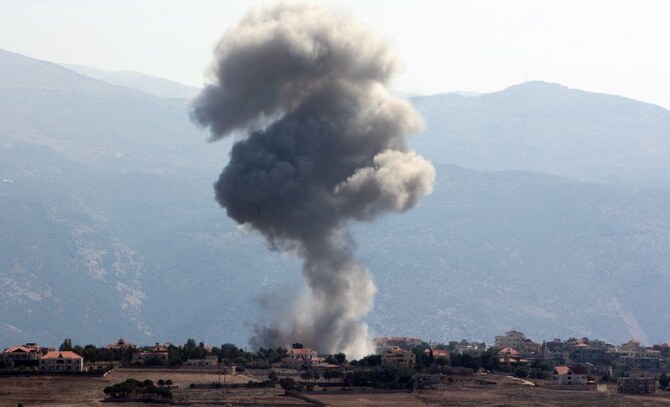
- ARAB NEWS
- 30 Jun 2025

The images coming from Lebanon are painful, terrifying and horrific. Bodies are being retrieved from under the rubble, and houses are burned or abandoned.
A million refugees — a record number in the country’s history. Some sleep in the open in the capital and others sleep in their cars because they cannot find anywhere else to go. Missiles rain down on the entire country. The stench of death permeates the air, mingling with fear and panic.
The regular Lebanese citizen feels wronged and isolated and lives in despair. He has no one to contact: there is no president of the republic to whom he can turn. Caretaker Prime Minister Najib Mikati is doing everything he can, while parliament Speaker Nabih Berri has no authority to draft a formula that could persuade the Americans to rein in the Israeli killing machine. The citizens cannot contact Hezbollah, which boasts an arsenal of rockets that were believed to be enough to deter Israel.
Some have spoken of “10 days that rocked Lebanon and its foundations.” It started with the detonation of communication devices on Sept. 17 and ended with the assassination of Hezbollah leader Hassan Nasrallah on Friday. The party has been dealt a crippling blow. It is an unprecedented blow to its leadership and military machine, exposing it in a country that is itself already exposed.
It was no easy feat for Benjamin Netanyahu to take a decision as big as assassinating Nasrallah. He knows that he was the No. 1 player in Lebanon and a prominent figure in the so-called resistance axis led by Iran. He knows that the assassination was no less significant than that of Qassem Soleimani.
More dangerous than anything else is that Netanyahu believes that Nasrallah’s assassination was necessary to create a change in the balances that Nasrallah and his friend Soleimani had tried to impose in the Middle East.
The extent of the strikes on Lebanon demonstrates that Israel has launched a coup against the position of the resistance axis in the region. It is a coup against Iran’s entire project. It is no simple thing for Joe Biden and Kamala Harris to claim that Nasrallah’s assassination brought a “measure of justice” to his victims.
Some history will help us understand the dangers of the present. Back in 1982, Menachem Begin was the prime minister of Israel and Ariel Sharon was his defense minister. We spoke to the No. 1 player in Lebanon at the time: Yasser Arafat. We asked him about the Israeli threats, to which he replied: “If Sharon is foolish enough to attack Lebanon, then he must prepare to receive waves of refugees from the Galilee settlements.”
The Palestine Liberation Organization used to use Katyusha rockets to attack Galilee and remind the world and Israel of its cause, and that Tel Aviv would not enjoy security without the Palestinians receiving their rights. The PLO’s arsenal was very modest compared to Hezbollah’s.
Weeks later, Israel launched Operation Peace for Galilee, which Sharon used to besiege Beirut, culminating in Arafat and the PLO leaving Lebanon. Israel believed that it could not coexist with the Lebanese borders to its north becoming Palestinian-Israeli borders.
The situation today is different. Hezbollah is Lebanese and its members are Lebanese, but Israel has taken advantage of the party’s “support front” for Hamas and Gaza to conclude that its borders with Lebanon have become Iranian-Israeli borders. The Netanyahu government believes that Yahya Sinwar carried out something that Hezbollah had threatened to do, which is raid Galilee. So, Israel decided to erase the Iranian-Israeli border, perhaps believing that any direct Iranian involvement in the battle would lead to an Iranian-American confrontation and place Iran’s nuclear facilities on the strike list.
The images from Lebanon are catastrophic. The whole country is under fire. It is exposed and Hezbollah is exposed. The raids and assassinations are relentless. The war has exposed a massive imbalance in power. The Israeli military machine is using its massive technological superiority in a brutal, merciless campaign.
Just two weeks ago, it was impossible for any observer to predict the images pouring in today. The impression was that Hezbollah was a solid, impenetrable force. Never has any armed faction been so compromised. Even Hamas, which is besieged in Gaza, never came under anything like this, despite the destruction that it and the enclave have incurred.
Who can help Lebanon out of this hell? And at what price? After all the damage it has incurred, can Hezbollah agree to take southern Lebanon out of the equation of fighting Israel? What other choice does it have? Where does Iran stand? Did it have an opportunity to intervene on the first of the 10 terrible days? Or is it incapable or unwilling?
The Israeli military machine is using its massive technological superiority in a brutal, merciless campaign.
Ghassan Charbel
Many questions will be raised when the inferno ends. How will Hezbollah interpret the major blows it has been dealt? What sort of relationship will its new leadership have with Iran in the absence of Nasrallah, who was seen as more of a partner? What will the relationship between Hezbollah and Lebanon be like, especially if a ceasefire calls for the renewed application of UN Security Council Resolution 1701 and a serious role for the army alongside the UN’s peacekeepers?
How will Hezbollah rebuild itself, specifically its role in the balance of power, and will it derive any lessons? The shape of Hezbollah after the storm will inevitably impact Lebanon, the rebuilding of its institutions and the restoration of its unity and regional position.
What about the “unity of the arenas?” What sort of Iran will we see when the storm ends and what role will it play inside and outside Lebanon? What sort of Syria will we see if it succeeds in keeping itself away from the unrest, taking advantage of Russia’s presence and possibly mending some of its Arab ties?